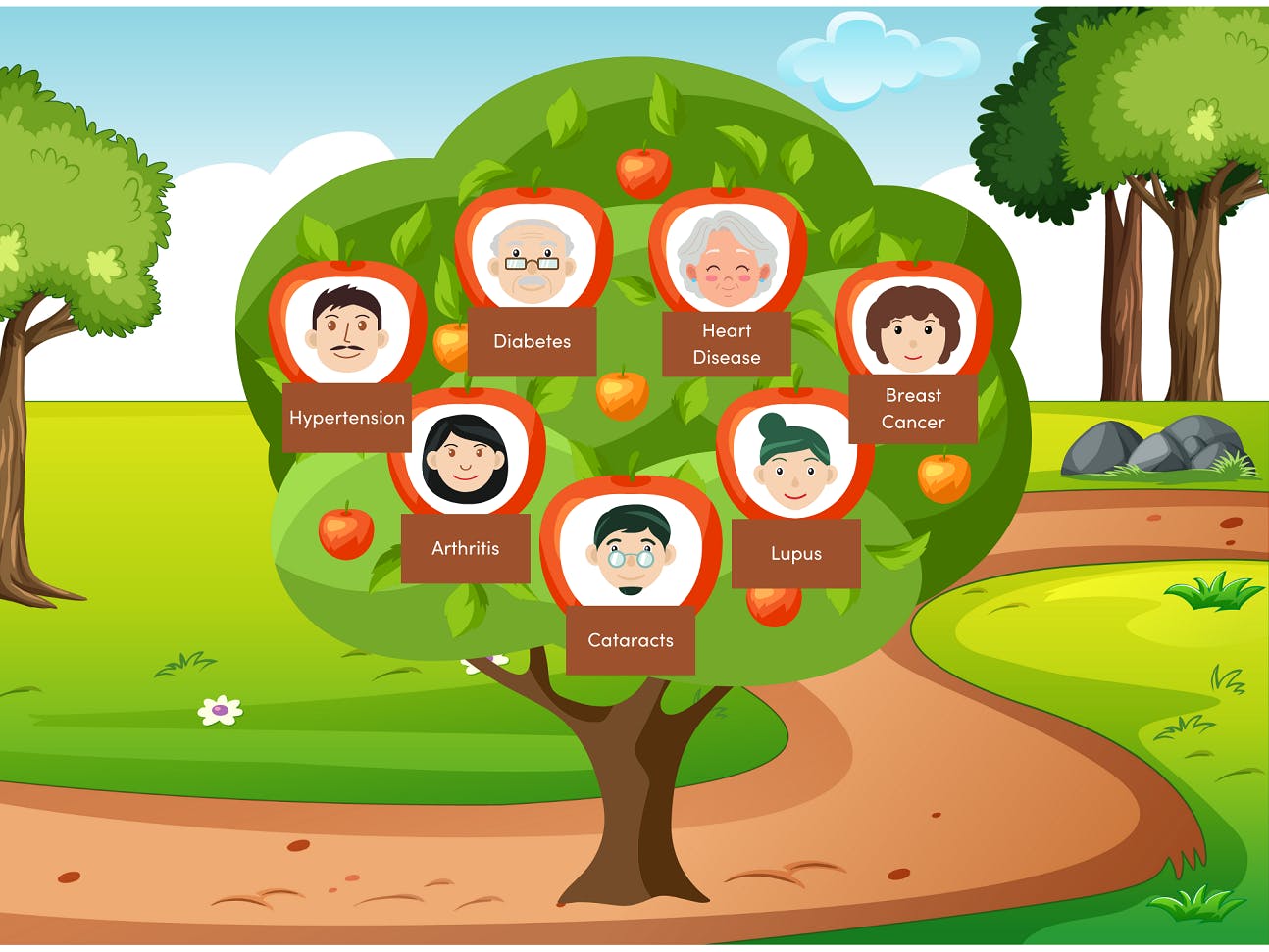
Your family’s health history can help you understand your genetic risks, allowing you to prevent or catch disease early.
Do you know what your dad’s sister died of? Or why Grandpa was in a nursing home for 12 years?
If you haven’t given much thought to such questions, it’s wise to start. The answers are an important part of your family health history—a record of health information about yourself and your close relatives.
Families have similar genetic backgrounds and may also have similar lifestyles and environments—all factors that may clue you into health problems that run in the family. By observing trends among your relatives, doctors can help you identify risk factors that could affect you or your loved ones in the future.
Why you need to know your family health history
A family health history can identify those with an elevated risk for common problems like heart disease, stroke, high blood pressure, diabetes, and certain cancers.
But just because a condition runs in the family doesn’t mean that you will develop it. In fact, knowing your family’s health history can spur you and other relatives to take steps to prevent it.
Although you can’t change your genes, you can change unhealthy behaviors that increase your likelihood of developing the disorder. For instance, shedding extra pounds, eating a healthier diet, and getting more exercise may help you fend off heart disease or diabetes.
In addition, “someone with a strong family history of breast or colon cancer may be screened earlier and more frequently for these diseases,” Elizabeth Lo, MD, a primary care physician and internal medicine specialist at the Lahey Clinic in Burlington, Massachusetts, told Everyday Health. Your doctor may also recommend surgery to prevent cancer if you are at high risk for it.
What family health history to collect
A complete family health record includes information from at least three generations of relatives. These include children, nieces and nephews, siblings and cousins, parents, uncles and aunts, and grandparents.
The National Library for Medicine and the Genetic Alliance suggest starting with the basics for each person:
- Name and how you are related (myself, cousin, child, etc.)
- Ethnicity, race, and/or family origins
- Date and place of birth
- Age and cause of death, if deceased
Next record each person’s health history, if known, including:
- Alzheimer’s disease
- Asthma and allergies
- Cancer (such as breast, ovarian, colon, prostate)
- Current and past medications
- Diabetes/sugar disease
- Heart disease
- High blood pressure
- High cholesterol
- Mental health disorders (such as depression, schizophrenia)
- Obesity
- Stroke
- Substance abuse (such as alcohol, drugs)
Be sure to include lifestyle factors, such as:
- Exercise
- Habits (such as smoking, drinking, regular doctor/ dentist checkup)
- Hobbies and activities
- Nutrition and diet
- Occupation
How to gather your family medical history
To get the information for your family medical history, check to see if there are family trees or charts of family members you can draw on. Information can sometimes be found in baby books and family bibles. You can also rely on obituaries or genealogical records, including death certificates.
Ask your living relatives in person or on the phone to get a more complete record. Birthdays, weddings, holiday gatherings, or reunions offer an opportunity to ask health-related questions.
You can also send out a survey with a holiday letter. “Happy holidays! Can you tell me what your parents died of?” is probably too abrupt! Instead, try presenting it as a gift: “This holiday, I’m thinking about how blessed I am to have you all as my family. I thought a nice (and practical!) way to honor this blessing would be to put together and share our family medical history, both for ourselves and for the generations still to come.”
If you are adopted, your adoptive parents may have some information. You can also ask to see the adoption agency records.
Saving your family health history
Using a computer or an app can make it easier to collect and store family health information. The National Human Genome Research Institute and the U.S. Surgeon General's Family History Initiative have developed My Family Health Portrait, a website to help you create a family health history. You provide your health information and then build a drawing of your family tree and a chart of your family health history. Both can be printed and shared with your family members and your doctor.
A free app called FamGenix also allows you to record and track family health information with a smartphone.
However you decide to collect and keep your family health history, you are making a wise investment in protecting your health and that of your loved ones.
Medicare and your family health history
Medicare typically does not cover the cost of genetic testing for hereditary cancer risk. There are some exceptions, such as testing for the BRCA gene mutations for certain high-risk individuals.
But if your family’s health history suggests a predisposition for cancer, diabetes, or other conditions, you can take steps to lower or manage your risk – and Medicare can help. For instance, if you have a family history of glaucoma, Medicare will cover an annual glaucoma test. Or if your parents both had lung cancer, you can find coverage for prescription smoking-cessation drugs, like Chantix, under Medicare Part D plans.
Medicare Advantage plans do even more to help keep you healthy. Many Medicare Advantage plans offer coverage for gym memberships and drug store allowances you can use towards nicotine patches, vitamins, sunscreen, heart rate monitors, and other health-related items.
Is your Medicare plan giving you all the benefits you deserve? Check out your options with our easy-to-use Find a Plan tool.
Additional Resources
- ClearMatch Medicare: Find a Medicare Plan
- Everyday Health: Understanding Your Family History of Disease
- ClearMatch Medicare: How to Create Your Personal Health Record



